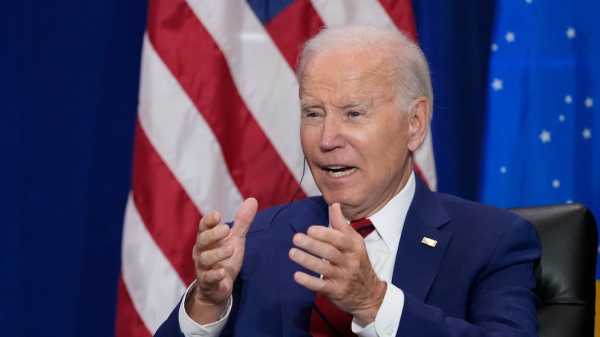
WASHINGTON — The Biden administration said Wednesday that it was granting temporary legal status to hundreds of thousands of Venezuelans who are already in the country — quickly making them eligible to work — as it grapples with growing numbers of people fleeing the South American country and elsewhere to arrive at the U.S. border with Mexico.
The move — along with promises to accelerate work permits for many migrants — may appease Democratic leaders who have pressured the White House to do more to aid asylum-seekers, while also providing grist for Republicans who say the president has been too lax on immigration.
The Homeland Security Department plans to grant Temporary Protected Status to an estimated 472,000 Venezuelans who arrived in the country as of July 31, 2023, making it easier for them to get authorization to work in the U.S. That's been a key demand of Democratic mayors and governors who are struggling to care for an increased number of migrants in their care.
That's in addition to about 242,700 Venezuelans who already qualified for temporary status before Wednesday's announcement.
Homeland Security Secretary Alejandro Mayorkas granted the expansion and an 18-month extension for those who already have temporary status due to “Venezuela's increased instability and lack of safety due to the enduring humanitarian, security, political, and environmental conditions,” the department said in a statement.
The administration said that it would accelerate work authorizations for people who have arrived in the country since January through a mobile app for appointments at land crossings with Mexico, called CBP One, or through parole granted to Cubans, Haitians, Nicaraguans and Venezuelans who have financial sponsors and arrive at an airport. It will aim to give them work permits within 30 days, compared to about 90 days currently.
The promise of accelerated work permits does not apply to people who cross the border illegally and seek asylum, who, by law, must wait for six months to receive work permits.
Mayors and governors have been clamoring for President Joe Biden to figure out a way for the administration to get newly arrived migrants to be able to work legally, so they can support themselves.
Democratic officials in New York, Massachusetts, Chicago and elsewhere have complained about the strain that newly arrived migrants are putting on their resources, especially in New York where the government is required to provide housing for anyone who needs it. The city is currently paying to house about 60,000 newly arrived migrants.
New York Gov. Kathy Hochul said in a statement late Wednesday after the news broke that she was “grateful the federal government has acted so speedily to grant one of our top priorities: Temporary Protected Status to Venezuelan asylum seekers and migrants who have already arrived in this country.”
The administration said it was also using Department of Defense forces to support Homeland Security staff on the border. Homeland Security already uses about 2,500 National Guard troops to help Customs and Border Protection. In the news release, Homeland Security said up to 800 new active-duty troops would also be detailed to the border; they would be used for things like logistics so as to free up the Customs and Border Protection officials to do more of the front-line responsibilities.
Homeland Security also relied on active-duty troops back in May to support its operations when a surge of migrants was being encountered at the border in anticipation of the end of Title 42. At the time, Homeland Security officials emphasized that the active-duty troops would not be used for things like working directly with migrants but purely to free up CBP personnel.
Homeland Security said it was also taking other steps such as scaling up a process started in May to quickly remove families who are found to have no basis to stay in the country. They said they've also beefed up their holding capacity along the southern border. And the agency said it has increased the number of people expelled from the country. Since May 12, the agency said it has removed 253,000 people to a little over 150 countries around the world. That compares to 180,000 removed during the same period in 2019 — before the pandemic drastically alerted the government’s ability to expel migrants.
___
Spagat reported from San Diego.
Sourse: abcnews.go.com






